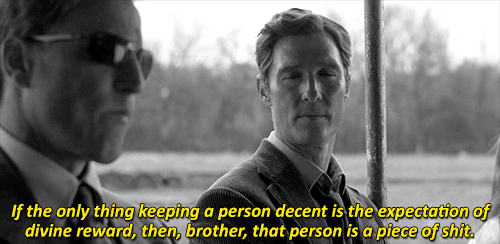Apparently, Germans can’t say “squirrel”, but it’s fun to watch them try.
Monthly Archives: June 2014
Today in Meta-Westerns
Or, what happens when everyone can hear the omniscient narrator.
Hey, turns out? The No-Fly list won’t fly
A Federal court has ruled that the Kafkaesque No-Fly list is unconstitutional.
More at TechDirt.
Olbermann on Soccer and Ties
I really, really love this guy.
Look, number 6 is a gimmee, but the rest of these are hard
Buzzfeed’s best quiz EVER: Did This Happen In The Mississippi Senate Primary, Scooby Doo, or a John Grisham Book?
Somewhat embarrassingly, I scored a perfect 10.
I’m glad we don’t live in a police state
…where heavily armed cops could barge into your home and nearly kill your child trying to serve a no-knock search warrent.
Oh. Wait.
The Swat team that burst into the Phonesavanh’s room looking for a drug dealer had deployed a tactic commonly used by the US military in warzones, and increasingly by domestic police forces across the US. They threw an explosive device called a flashbang that is designed to distract and temporarily blind suspects to allow officers to overpower and detain them. The device had landed in Bou Bou’s cot and detonated in the baby’s face.
Stop letting police get away with behaving like military units. Policing is not a war. Cops who do things like this should be vulnerable to severe civil and criminal penalties. Only then will this stop.
(This coverage is, of course, at the Guardian. That’s shameful.)
Obviously, this happened in Florida
Coolest. Watch. EVER.
Of course, it better be, as the Van Cleef & Arpels Midnight Plantarium Poetic Complication runs a cool $245,000.
The face itself is amazing:

At the center is the Sun, represented in pink gold. Surrounding it are gems representing the six innermost planets, each of which rotates the Sun in real time — by which I mean Mercury takes 88 days to go ’round, the Earth takes a year, and Saturn won’t make the trip for nearly 30 years. The actual time of day is represented by a shooting star on the outermost ring. By rotating the bezel, you can set the watch to note a “special” day — on which the Earth stone passes directly under a star engraved onto the crystal itself.
Click through for video. It’s totally ridiculous and over the top, but also cool as screaming fuck that this is all done with gears and springs.
Thank God this isn’t real
I’d say that “Business Fantasy” is too manifestly ridiculous to really exist, but, well, if I’m honest I admit some demented sumbitch will probably write some just to be contrary.
The Wisdom of Rust Cohle

“Nice camera. Whatcha lookin’ at?”
Man works in wilderness. Man takes pictures. Bear becomes curious. Man is boring. Bear wanders off.
Man exhales.
Alert: Heathen Birthdays
Today is the birthday of two important Heathen: one of my very oldest friends, and one of my very newest.
This is Agent R. He and I were geeky Boy Scouts together more than 30 years ago. He had the first modem I ever saw, not to mention — years later — the first CD player. He’s pictured here with someone who I trust will become a friend, but whom I have not yet met.

And this here is the tiniest niblet o’corn ever, Miss E. I. H., late of the Glenbrook Valley area and, as of a few weeks ago, our goddaughter. As Agent R completes his forty-fifth (!) trip around the sun, this little delight finishes her first lap.

Happy birthday to both.
“Peekaboo! Hello!”
Wyoming to Science: Drop Dead
Apparently seeking to exceed my home state in sheer pigheaded ignorance, the state school board in Wyoming has rejected the Next Generation Science Standards:
The science guidelines in question are the Next Generation Science Standards (NGSS), adopted so far by 11 states and the District of Columbia. The National Research Council, the National Science Teachers Association and the American Association for the Advancement of Science—working with 26 state governments—developed the NGSS to update K-12 science education in schools for the first time since 1998. Essentially the NGSS provides benchmarks for what students should learn in each grade, but leaves decisions about specific textbooks and how to teach the curriculum up to individual districts, schools and educators.
In Wyoming, a committee comprised of 30 science educators spent 18 months studying and comparing the NGSS with existing guidelines in other states, and then unanimously recommended that it be adopted by the State Board of Education. However, in March, the legislature added a footnote to the state budget that prohibited any public spending to implement the NGSS—effectively killing it. Then, a month later, the State Board of Education told the committee of science educators to develop a new set of standards, which would better reflect the values and economic interests of Wyoming.
The chair of the state board opined that he doesn’t accept climate change as a fact, and frets that the standards are biased against fossil fuel development.
Unpack that for a minute: the standards suggest children lean settled science. The science shows that fossil fuels are causing no small amount of harm. They are concerned that learning this information will hurt an industry.
I mean: Damn.
Last night, Mrs Heathen and I watched the episode of Cosmos about Clair Patterson’s work exposing the dangers of lead emissions from gasoline, and how vigorously opposed he was by the oil industry at the time.
The oil goons even had a so-called expert on their payroll who insisted that the levels of lead in the environmental background at the time were completely normal. (Eventually, Patterson prevailed, and lead has been phased out — and, wouldn’t you know it, lead levels have dropped dramatically.)
You’d think they’d learn, but apparently not. You’d think we as a culture would learn, too, not to listen to people who say pollution is no big deal when they stand to make money doing so.
Today in “Adobe Hates You” news
It has come to my attention that there exists a “no-code” website creation tool from Adobe called Muse.
Muse, like countless such tools before it, purports to allow a user to create and manage a site without writing any code. This is a laudable goal.
As with most such tools, the work is done locally, and the tool only sends the files to the web server when the user is satisfied they’re ready. The actual transmission of the files from the user’s machine to the web server is hidden.
Fifteen years ago, we could be pretty certain that the transmission was happening using FTP, a venerable protocol that has fallen COMPLETELY from favor because it’s staggeringly insecure. Nothing about it is encrypted — not even usernames and passwords. This means any fool with a sniffer can own your web site, which is generally considered a problem.
For this reason, FTP usage has dropped off considerably in recent years; I don’t think I’ve run a server with FTP enabled in over a decade. There is, however, a work-alike protocol that leverages the excellent SSH libraries to create a secure, encrypted transmission channel. It looks like FTP and acts like FTP, but under the hood it’s secure. This is a good thing. SFTP has almost completely replaced FTP as a result.
And this is why we know Adobe hates you, because Muse, a tool introduced in 2012, does not support anything but FTP, and they’re not planning to add SFTP any time soon. Their actual advice is to use an external FTP client if you need a secure channel.
Whiskey. Tango. Foxtrot.
Dear Adobe: DIAGF.
yes i said yes i will Yes
Happy Bloomsday. This year marks the 110th.
Sometimes, you can watch the zeitgeist change right in front of you
NSA whistleblower Edward Snowden has made the all-important move from “news figure” to “figure in popular culture used for advertising.”

The shot above is pulled from the Net, but there’s a matching one here in Houston at the intersection of Almeda and Southwest Freeway.
In the land of no accountability
I’ve long been shocked by how often right wing media pundits manage to be catastrophically wrong, over and over, and yet never get called on it. Bill Kristol is a great example (see link), but he’s absolutely not the only one.
How is it that you can go on TV and be recorded saying things that are, over and over, proved to be completely incorrect? More amazing: they presumably get PAID to do this. I mean, that’s something else again, isn’t it? Media organs other than Fox, even are bringing the idiot architects of the Iraq invasion back on the air to discuss what’s going on there today. It’s amazing.
No less a jackhole than Ari Fleischer has taken to Twitter lately to complain about Obama’s handling of Iraq, which takes balls the size of Yankee Stadium; without Fleischer and his boss cheerleading an all-too-compliant press into invading Iraq, we wouldn’t be facing the prospect of a failed state there.
People other than Media Matters really need to stomp on these fuckers, and demand they answer for their past lies, prevarications, and wrongheaded predictions before giving them a platform for MORE bullshit. Isn’t that the base mission of media in a free society? Why, exactly, should we listen to these fuckers again?
This is one of those times Tom Tomorrow knocks it out of the park
The Anti-Party.
How We Are Doomed
How Corporations became people you can’t sue:
Following the 2011 and 2013 Supreme Court rulings, dozens of other giant corporations—from Comcast and Wells Fargo to Ticketmaster and Dropbox—have secured the same legal immunity. So have companies ranging from airlines, gyms, payday lenders, and nursing homes, which have quietly rewritten the fine print of their contracts with consumers to include a shield from lawsuits and class actions. Meanwhile, businesses including Goldman Sachs, Northrop Grumman, P. F. Chang’s, and Uber have tucked similar clauses into their contracts with workers.
Hastily clicking through terms of service is now all it can take to surrender your rights to these companies. Once you do, your only path for recourse if you’re harmed by any one of them is “mandatory arbitration,” where the arbitrator is often chosen by the corporation you’re challenging, and any revelations about the company’s wrongdoing tend to be kept secret. Rather than band together under the light of the public courtroom, each individual has to work through the darkness of a private tribunal, alone, where arbitrators can interpret laws however they wish. Certain inalienable rights, the Court has ruled, are actually kind of alienable.
Oh, here’s a shocker: The TSA is screwing up “PreCheck”
Frequent Flyer guru Joe Brancatelli has more.
“Mostly snakes”
As reasonable a description of Pentecostalism’s origins as you’re likely to find:
my favorite thing about Pentecostal snake handling is that at some point somebody read the whole Bible and his one takeaway was “SNAKES”
“what did you get out of the Bible, Jim”
“mostly that we should touch snakes”
“anything else”
“there was some guy but mostly snakes”
Seen on Maud Newton’s blog, but the author is apparently this dude.
Airlines to Travelers: Drop Dead
American, Delta, and United all just reduced the maximum size allowed for carryon bags.
Man, FUCK those guys. Seriously.
Also for Ygritte
This short clip is spoilery for last week’s GOT, but you should watch it anyway.
“For Ygritte…”
This is all over the net, but it turns out the Game of Thrones theme works really well as Dixieland:
Enjoy.
In which web nerds make you cry
A long time ago, there was the boom. It was fun. It always is, with other people’s money. Then the boom stopped, and I needed work. I got a pretty good opportunity freelancing, and made a real living at it for a while, largely because I spent a good chunk of my suddenly “at liberty” time figuring out a new web technology called cascading style sheets, or CSS.
What they actually do isn’t important to the story, but I’ll note they were weird and different and confusing, and suggested major changes to the way web pages got built. That the change was a huge improvement, semantically speaking, didn’t make it easier for the folks mired in the old way. But I wasn’t, and so I waded into the deep end of CSS work unencumbered with “how we used to do it” -ism, and with a very serious weapon on my desk. A guy named Eric Meyer, see, had written a book called Cascading Style Sheets: The Definitive Guide (for O’Reilly, obviously), and I made it my bible.
With it, I managed not to go bankrupt. With it, I kept my house and my car and even had some money to spend on fun things. I was still leveraging these skills years later, in 2007, when I joined my current employer.
Because, in no small part, of that book, and of Meyer’s active participation in developer forums and the CSS-D listserve. And I’m certainly not the only person who has that kind of story about Meyer and his book and his activism.
I don’t do that sort of work anymore. I still find it fascinating, and I still read the blogs and now Twitter feeds of lots of the people who defined markup and web work in the early 2000s, which is how I found out that Eric Meyer’s young daughter had cancer, and how I found out, a little while ago, that she died on Saturday. She was six.
Six.
Today, apparently, is the day of the service. Web people all over are making their Twitter avatars purple, in honor of Becca Meyer, who had a favorite color as only children can. And this is where nerds make you cry.
In HTML and CSS, colors are typically specified by a six-digit code in hexadecimal, like #FF0000 (which is a red). You can, though, use just basic words for some colors. “Red” works, as does “blue” and “black” and even things like “lightcoral”.
There is an organized movement online now to include in CSS4 the named color “beccapurple”, equivalent to #663399, as a memorial.
I think that’s mighty fine.
Wow, I knew Bon Jovi sucked, but this is ridiculous
WORST SURPRISE EVAR

Fuck the Cup
The World Cup begins shortly, but I’ve got no plans to give it any time whatsoever. I watched a bit last time around, and it was enough to give me the idea — since reinforced — that big-time soccer is an enormously corrupt institution (example: when an in-stadium replay showed a ref had badly erred, the official response was to discontinue in-stadium replay). But that’s really just the tip of the shit iceberg where FIFA is concerned.
John Oliver has more, and you should watch it. Oliver, tragically, is British, and therefore unable to see soccer for what it is (a sport apparently invented to make baseball look exciting), so he’s planning to watch anyway. Not so us.
The Lavabit Founder Speaks
Writing in The Guardian — which is, apparently, the only newspaper left with any balls — Ladar Levison explains the horrifying and Kafkaesque process by which the greedy, powermad, overreaching Feds forced him to destroy his business.
He was given no real chance to fight the orders, and when he tried to muster a defense the Feds became vindictive. This isn’t justice, or national security. This is abuse of power. It should result in long prison terms, but of course nothing of the sort will happen. The government still wants Snowden to come home and face trial for the “crime” of telling us all what our government is doing in our name; those responsible for the criminally invasive universal surveillance will never face accountability of any kind.
In honor of his unconscionable absence last evening…
…how about The Peter Dinklage Theme Song.
(And, just because we’re on the subject: Peter Drunklage.)
(MeFi.)
Books of 2014, #11: Never Go Back, by Lee Child (Reacher #18)
Reacher finally makes it to Virginia, where madcap hilarity most decidedly does NOT ensue.
I mentioned before how Child had been building multi-book continuity related to Reacher’s desire to meet the current commander of his old MP unit. It was a new and welcome development, and probably mandatory given that, thus far, Reacher really hasn’t “developed” at all.
I’m therefore disappointed to report that Child more or less whiffs the finish. He gets there, solves the local mystery that inevitably involves his cross-country telephonic crush, and rides off into the sunset again. Even the somewhat shocking idea of Reacher being “reactivated” against his will, and therefore doing most of the book as an AWOL major, ends up being sort of meaningless.
Meh.
Books of 2014, #10: One Hundred Years of Solitude, by Gabriel Garcia Marquez
Honestly, it’s sort of surprising that I had never read this before. My literary reading has been, for decades, focussed primarily on postwar American works, with only occasional forays elsewhere, and that’s probably something I should address. On the other hand, there’s a lot of great stuff in that category, and there’s only time for so many books (especially this year, with my reading time severely curtailed by the new Less Chet is More Chet program).
Anyway, there it is: I’m new to Marquez. The book itself is hard to read in 2014 the same way it was read in 1967; the literary world has moved quite a bit since then, and this book is part of that movement. It’s obviously a titanic novel, rich in nuance and depth, but it’s also of a piece with its time, and it’s only in reading commentaries after I finished the book that I realized how many plot points in it were taken from actual historical events.
It’s also the sort of book that washes over you like an unrelenting wave; it’s clear that there are aspects to this work that will only become clear on repeated exposure, as with something like Ulysses or Infinite Jest.
Honestly, there’s just SO MUCH going on here, and it’s written so well, that it’s almost overwhelming; Harold Bloom said of it “My primary impression, in the act of rereading One Hundred Years of Solitude, is a kind of aesthetic battle fatigue, since every page is rammed full of life beyond the capacity of any single reader to absorb… There are no wasted sentences, no mere transitions, in this novel, and you must notice everything at the moment you read it”, and he’s not kidding. Marquez is harsh about some aspects of this world (like Faulkner’s treatment of Mississippi), but there’s also a love here that you don’t normally see in a Yoknapatawpha story. Surprisingly (post)modern techniques surface here, too — intertextuality, for sure, but that’s not the end of it. One gets a very “all of this has happened before, and all of this will happen again” feeling upon its completion.
Am I not saying enough? Well, it’s probably because even nearly a month later — I finished it in mid-May — I’m still turning it over in my head. But that’s a good thing.
Knee-jerk authoritarian ignorance in a southern school? UNPOSSIBLE!
Why are Cory Doctorow and his publisher sending 200 free books to Pensacola, Florida?
My publisher, Tor Books, is sending 200 free copies of the paperback of my novel Little Brother to Booker T Washington High School, because it’s the first school where any of my novels has been challenged by the school administration. Little Brother had been selected and approved as the school’s summer One School/One Book reading pick, and the school librarian Betsy Woolley had worked with Mary Kate Griffith from the English department to develop an excellent educational supplement for the students to use to launch their critical discussions in the fall. The whole project had been signed off on by the school administration and it was ready to go out to the students when the principal intervened and ordered them to change the title.
In an email conversation with Ms Griffith, the principal cited reviews that emphasized the book’s positive view of questioning authority, lauding “hacker culture”, and discussing sex and sexuality in passing. He mentioned that a parent had complained about profanity (there’s no profanity in the book, though there’s a reference to a swear word). In short, he made it clear that the book was being challenged because of its politics and its content.
Seriously, fuck that guy.
More proof that Diageo hates you
After outright lying about the “orphan barrel project” whiskey’s origins, they’ve gone and done hilariously cartoonish branding and marketing for the whiskies, and completely ignored the real history of the bourbons inside.
Man, fuck those guys.
“This is a story about a video game…”
This brilliant bit about beating Dragon’s Lair has been widely linked, but that makes it no less deserving of your time if you haven’t seen it.
“The truth is everything is breaking all the time, everywhere, for everyone.”
This is one of those articles that’s so true it hurts. Here’s the first bit:
All programming teams are constructed by and of crazy people
Imagine joining an engineering team. You’re excited and full of ideas, probably just out of school and a world of clean, beautiful designs, awe-inspiring in their aesthetic unity of purpose, economy, and strength. You start by meeting Mary, project leader for a bridge in a major metropolitan area. Mary introduces you to Fred, after you get through the fifteen security checks installed by Dave because Dave had his sweater stolen off his desk once and Never Again. Fred only works with wood, so you ask why he’s involved because this bridge is supposed to allow rush-hour traffic full of cars full of mortal humans to cross a 200-foot drop over rapids. Don’t worry, says Mary, Fred’s going to handle the walkways. What walkways? Well Fred made a good case for walkways and they’re going to add to the bridge’s appeal. Of course, they’ll have to be built without railings, because there’s a strict no railings rule enforced by Phil, who’s not an engineer. Nobody’s sure what Phil does, but it’s definitely full of synergy and has to do with upper management, whom none of the engineers want to deal with so they just let Phil do what he wants. Sara, meanwhile, has found several hemorrhaging-edge paving techniques, and worked them all into the bridge design, so you’ll have to build around each one as the bridge progresses, since each one means different underlying support and safety concerns. Tom and Harry have been working together for years, but have an ongoing feud over whether to use metric or imperial measurements, and it’s become a case of “whoever got to that part of the design first.” This has been such a headache for the people actually screwing things together, they’ve given up and just forced, hammered, or welded their way through the day with whatever parts were handy. Also, the bridge was designed as a suspension bridge, but nobody actually knew how to build a suspension bridge, so they got halfway through it and then just added extra support columns to keep the thing standing, but they left the suspension cables because they’re still sort of holding up parts of the bridge. Nobody knows which parts, but everybody’s pretty sure they’re important parts. After the introductions are made, you are invited to come up with some new ideas, but you don’t have any because you’re a propulsion engineer and don’t know anything about bridges.
Would you drive across this bridge? No. If it somehow got built, everybody involved would be executed. Yet some version of this dynamic wrote every single program you have ever used, banking software, websites, and a ubiquitously used program that was supposed to protect information on the internet but didn’t.
Go read the whole thing.
(Via MeFi.)
BTW, Quinn Norton makes similar points here.
It’s the tiny mirror that kills me
Via Laughing Squid, we find Tiny Hamsters Eating Tiny Burritos.
This is not a test.
For some, we have always been at war with Eastasia.
The rapid about-face on Bergdahl just drives home the fact that pretty much ONLY Obama could get in trouble with the right wing for bringing home a POW.
This isn’t the first time we’ve seen the wingnutosphere flip-flop this way; in fact, Bill Maher has a term for it: to “Blacktrack”, defined as “the act of changing one’s mind because President Obama agrees with you.”
And now, Natalie Dormer explains Game of Thrones
Because there’s nothing law enforcement hates more than transparency
In order to prevent the records from being turned over to the ACLU, it appears US Marshalls have “seized” documents regarding the use of a surveillance tool called Stingray by the Sarasota Police Department.
ACLU staff attorney Nathan Freed Wessler called the move “truly extraordinary and beyond the worst transparency violations” the group has seen regarding documents detailing police use of the technology.
“This is consistent with what we’ve seen around the country with federal agencies trying to meddle with public requests for stingray information,” Wessler said, noting that federal authorities have in other cases invoked the Homeland Security Act to prevent the release of such records. “The feds are working very hard to block any release of this information to the public.”
Some judge needs to remind these chuckleheads who they work for.
DINNER IS COMING
Oh, just click it.
John Oliver explains Net Neutrality
Still confused? Go watch.
Oh, and, at the end, when he calls folks to action? He had some success.
HOWTO: Treat Glassholes appropriately
glasshole.sh. Heh.

